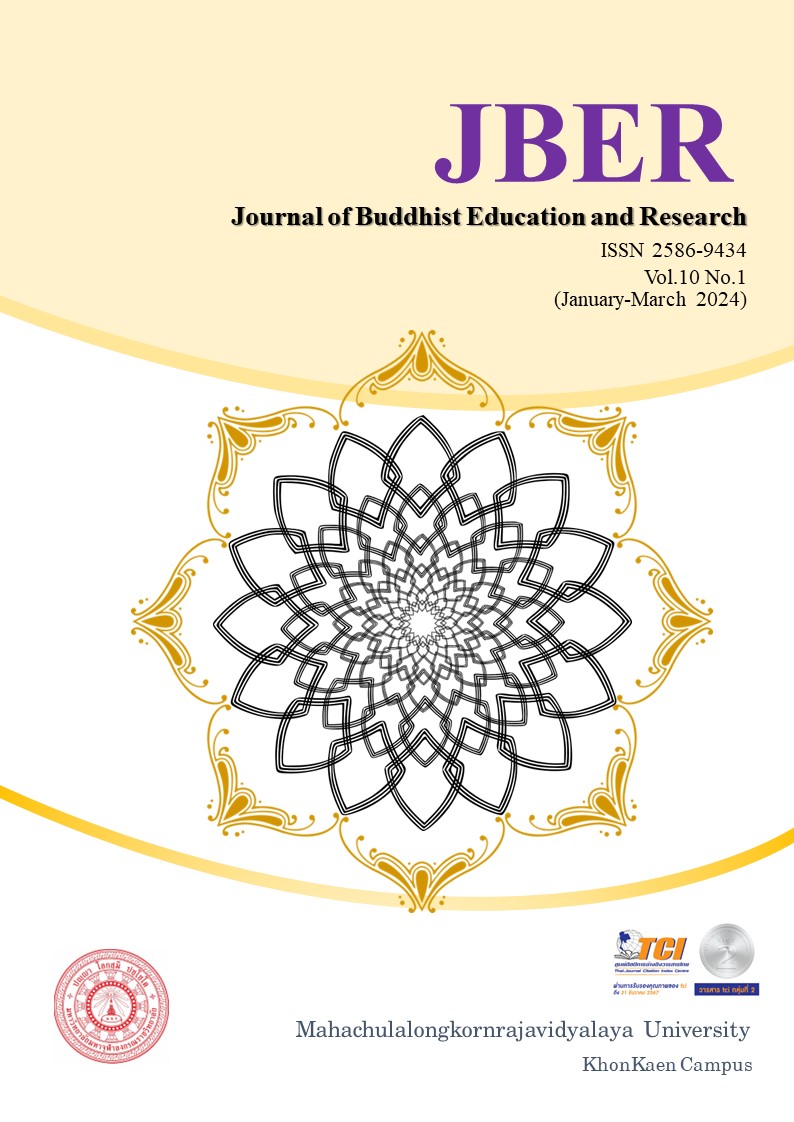AN ANALYSIS OF BUDDHIST ETHICS IN THE PRESERVING NATURE AND ENVIRONMENT
Keywords:
Buddhist ethics, preserving, nature and environmentAbstract
The objectives of this research were 1) to study the concepts of nature and environment 2) to study Buddhist ethics related to nature and environment and 3) to analyze Buddhist ethics in the preserving nature and environment. It is a documentary research, by studying documentary information and related research and analyzing the results with a descriptive method. The research found that:-
The nature and environment are things that occur naturally, useful and able to meet the needs of humans or human can be used to benefit in their livelihoods, including there are physical and biological characteristics around humans that occur naturally and man-made things such as forests, rivers, wildlife, etc., which are always changing both naturally and by human actions.
Buddhist ethics has been linked to nature and the ecological environment from the past to the present. The ecology teaches humans how to preserve nature and the environment. On the other hand, Buddhist ethics teaches people to be kind and to treat nature as part of their lives. The destruction of nature and environment would have consequences for the existence of life and other things that are related to nature and the environment.
The preserving nature and environment according to Buddhist ethics is a study aimed at understanding the roles and functions of human beings toward nature and the environment, and most importantly, it makes people understand that they are not the center of nature and environment, but it's just something One that is subject only to nature and the environment, therefore, humans should not deal with nature and environment, but to accept that humans are merely residents of nature and environment to live, without nature and a rich environment humans cannot survive. It is the duty of humans to help preserve nature and environment to remain sustainable forever.
References
Donald kozlovsky, (1974) An Evolutionary and Ecological Ethics, (Englewood Cliffs : Prentice-Hall.
Thurman, Robert A.F., (1984) Buddhist Views of Nature : Variations on the Theme of Mother-Father Harmony, in On Nature, (Notre Deme : University of Notre Dame Pres.
คณาจารย์ มหาวิทยาลัยมหาจุฬาลงกรณราชวิทยาลัย, (2559) พระพุทธศาสนากับนิเวศวิทยา, (พระนครศรีอยุธยา : มหาวิทยาลัยมหาจุฬาลงกรณราชวิทยาลัย.
จักรพรรณ วงศ์พรพวัณ, (2561) นิเวศวิทยาเชิงพุทธกับแนวคิด คุณค่า และการเสริมสร้างการอนุรักษ์ป่าชุมชนในจังหวัดขอนแก่น, สถาบันวิจัยพุทธศาสตร์ มหาวิทยลัยมหาจุฬาลงกรณราชวิทยาลัย.
ประเวศ อินทองปาน, พระพุทธศาสนากับสิ่งแวดล้อม, (2559) กรุงเทพมหานคร : สำนักพิมพ์มหาวิทยาลัยเกษตรศาสตร์.
พยุง ศรีจันทวงษ์และสาคร พรหมโคตร, (2561) จิตอาสากับบทบาทการอนุรักษ์และการจัดการป่าชุมชน: กรณีศึกษาภูตาโปง ป่าชุมชนบ้านบุงกุ่ม ต.นาหอ อ.ด่านซ้าย จ.เลย, จิตอาสากับการพัฒนาสังคมที่ยิ่งยืน, การประชุมวิชาการระดับชาติ ครั้งที่ 5 เล่มที่ 3 มจร วิทยาเขตขอนแก่น.
พระมหามิตร ฐิตปญฺโญ (วันยาว), (2559). ความรู้จักประมาณในพระพุทธศาสนากับหลักเศรษฐกิจในแนวพระราชดำริ, รายงานวิจัย, มหาวิทยาลัยมหาจุฬาลงกรณราชวิทยาลัย,





